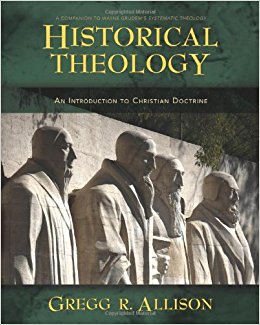Historical Theology: An Introduction to Christian Doctrine
- Approximate Time Commitment: 10 minutes
HISTORICAL THEOLOGY: An Introduction to Christian Doctrine by Gregg R. Allison focuses on the history and theology of the Christian faith. This book review was written by Hank Griffith of South Suburban Evangelical Free Church in Apple Valley, Minnesota. This book is good for anyone who is interested in the history and theology of the Christian doctrine.
Resource Description
The author of this 700-plus page book, Gregg R. Allison, is Professor of Christian Theology at Southern Baptist Theological Seminary in Louisville, KY. Before earning his Ph.D. at Trinity Evangelical Divinity School and becoming a theological educator, Allison served for 18 years as a staff member of Campus Crusade (CRU), where he worked in campus ministry, as well as serving as a missionary to Italy and Switzerland. He also co-pastored a church in Lugano, Switzerland.
Shortly after its publication in 2011 a reviewer wrote: “Historical Theology is patterned after Wayne Grudem’s, Systematic Theology and follows a topical-chronological framework that makes studying historical theology a real delight. For those familiar with historical theology, a discipline that is often presented in a dull and dreary manner, Allison’s work is a gift that will be utilized and appreciated by many Bible students and pastors.” I agree with this assessment.
Though this book is not for everyone, personally it was one of the most enjoyable books I’ve read, or perhaps I should say, “studied” in a long time. The discipline of “historical theology” is a combination of theology and church history. I have a keen interest in both. This well researched tome aided me in making sense of many things I see and read today. More importantly I believe it has assisted me in being better at what I am passionate, i.e. helping people from various backgrounds become devoted followers of Jesus Christ.
The structure of Historical Theology is a key feature of this volume. Because it is meant to be read in conjunction with a systematic theology book, it is structured according to the traditional theological topics and related subtopics. It differs from most historical theology textbooks, which follow church history surveys and tend to follow a mostly chronological narrative.
Within the chapters themselves, Allison develops each topic chronologically, moving from the Patristic era to the Modern period. He focuses upon major figures and themes, with periodic primary source selections included in the text.
Though not everyone will like this approach, I genuinely do. I think I will be able to use it as a future reference to learn rather quickly what theologians have taught on any particular doctrine down through the centuries.
Another useful feature of Allison’s textbook is the substantial glossary of terms and figures. I read through the whole glossary learning much about significant theologians, theologies, heresies, church councils, movements, etc. over the last two thousand years.
Reading Historical Theology broadened and deepened my understanding of the Christian faith in all of its diversity. It assisted me in understanding the beliefs and practices of various denominations and movements over the last two thousand years. It opened my eyes as to the origin of certain modern practices and beliefs. It enabled me not only to see that there has been controversy and heresy over the centuries, but how to deal with it. It showed me that some of the theological debates we are having today really aren’t all that new. It helped me to know what I believe and to be a little more tolerant of those who believe differently than I.
In addition, I loved reading the conversion stories of a number of Christians, such as Augustine, Luther, and Wesley.
However, there is at least one major weaknesses in this volume – it is devoted almost exclusively to the Western Church, i.e. Roman Catholicism and Protestantism. There is very little on Eastern Orthodoxy and almost nothing on contemporary Christianity in its various forms in Africa, Asia, and Latin America.
As I conclude this review, I remind myself that just knowing about the Christian faith is not enough. I must believe it, practice it, and proclaim it. Let me add that it is my observation that there is an anti-intellectual attitude among many evangelicals. Though I am just an ordinary man of average intelligence, I have the strong conviction that we should become all we can be for Christ. That means, among other things, we should strive to learn about our faith – its beliefs, it practices, and it history, so that we can dialogue with educated people and present the gospel to them in an intelligent fashion.
“But in your hearts honor Christ the Lord as holy, always being prepared to make a defense to anyone who asks you for a reason for the hope that is in you; yet do it with gentleness and respect” (1 Peter 3:15.)
HG
Only logged in customers who have purchased this product may leave a review.



Reviews
There are no reviews yet.